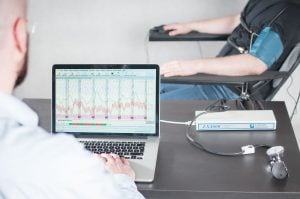Forensic Psychology – An Overview
Forensic Psychology is predominantly used in criminal cases to determine the relationship between the human behaviour and the relevance and correlation to the criminal act and law. As a derivative of general psychological practices, The American Psychological Association define the process as being research into the human behaviour and how this can be connected to both criminal and civil law. The forensic Psychologist would appear in the court room as a professional witness and is questioned on the basis of the suspects crime.
How is Forensic Psychology related to the Private Lie Detector Test?
It is often assumed that the private lie detector test is purely focused on physical signs of deception and most of the rumours around cheating a test are based on trying to trick a machine. With modern equipment such as Lafayette Polygraph Instruments, the potential to deceive is vastly reduced. Secondly, most importantly the test is conducted by a forensic psychologist who is drawing analysis on the subject from the start of the process and throughout the polygraph examination. The APA identified the benefits in assessing the thoughts of a suspect at the time of a crime and in a private matter such as infidelity, the thoughts, provocation and psychological make up of the suspected party can also be measured and help substantiate findings whilst support the polygraph element of the test.
Lie Detector Test = Psychological Testing + Physiological Testing
The Lie Detector Test conducted by our practitioners has a greater level of accuracy and reliability because of involvement of forensic psychology in determining the level of deception in questioning. Archaic examination styles which rely purely on aged polygraph equipment are both unreliable and not suitable for resolving issues. The growth of such testing into the public sector has been widely covered with inclusion into counter terrorism, sex offender rehabilitation and high level security clearance it is paramount to understanding the Lie Detector Test is more than what meets the eye.
We are often asked why the test could take up to 3 hours to conduct, so In terms of sharing knowledge we felt it was important to reiterate the fact that there is many variable being measured other than those which are immediately obvious. The industry is constantly developing advanced practices to there are many benefits still being realised from combining technology, polygraph and psychology.
The Psycho- Analysis involved in the testing process is one more significant factor to support findings and substantiate reports. There are also a number of new technological advancements with the emergence of advanced brain sensory recognition (MRI), body suits and the future improvements of the polygraph test will be widely dictated by the progression of such technology and the introduction into the mainstream.
“It has been demonstrated that when someone is lying, areas of the brain linked to decision-making are activated, which lights up on an fMRI scan for experts to see. While laboratory studies showed fMRI’s ability to detect deception with up to 90 percent accuracy, estimates of polygraphs’ accuracy ranged wildly, between chance and 100 percent, depending on the study. The Penn study was the first to compare the two modalities in the same individuals in a blinded and prospective fashion. The approach adds scientific data to the long-standing debate about this technology and builds the case for more studies investigating its potential real-life applications, such as evidence in the criminal legal proceedings”
Perelman School of Medicine at the University of Pennsylvania

Recommended Further Reading
https://www.sciencedaily.com/releases/2016/11/161103141437.htm


